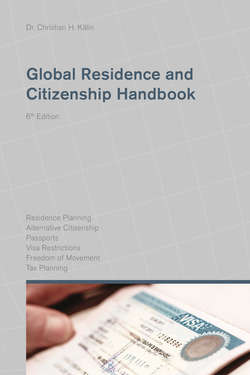Читать книгу Global Residence and Citizenship Handbook - Christian H. Kälin - Страница 17
На сайте Литреса книга снята с продажи.
1.3Change of tax residence
ОглавлениеEven in countries which base their tax residence determination mainly or only on habitual residence, tax authorities begin to take note when (wealthy) taxpayers move abroad – or “arrive”, i.e. start to spend a considerable amount of time in the country without necessarily declaring themselves as resident.
It can well be that even a change of residence abroad for two to three years may no longer be sufficient to “get rid” of the tax residence status if later on that taxpayer returns to the same country. Complicated and costly arguments can emerge with the tax authorities, during which the taxpayer often loses. Even if the facts are quite clear and in favor of the tax payer, and a tax lawyer may insist that they have a “good case”, tax authorities, once on the case, often win simply because if it goes to court, in most cases the courts rule in their favor. With tax authorities in high-tax countries coming under increased pressure to collect more revenue, it is likely that they will scrutinize even more carefully cases worth their while.
For wealthy individuals moving their tax residence from one country to another, it is extremely important to plan a move carefully, and to anticipate possible issues later on depending on what the intention is in a few years’ time. It is also critical that all laws and regulations are carefully observed, and that one’s life can be properly organized around those rules without it being uncomfortable and impairing one’s quality of life.
Besides tax residence, of course, other factors such as the impact on your matrimonial property regime, or the inheritance law applicable if you pass away, are important. Here, if habitual residence were the sole connecting factor, your matrimonial, property and inheritance rights would be subject only to the legal system of the country where you happen to be resident. In many instances, however, this is not the case: matrimonial property regimes may remain the same, either by law or by express choice (for example by a notarized marriage contract concluded between the spouses in order to establish the law applicable on their marriage and in particular their matrimonial property regime).
Due to the significant impact on a person’s estate, it is essential to determine one’s domicile, especially if the person is effectively connected to and resides in more than one country. Moreover, each country has its own tax laws and regulations which will establish the tax liability if considered a tax resident. Therefore, when a person wishes to change tax residence status, it is important to ascertain what will constitute domicile or habitual residence in the eyes of the particular jurisdiction.
Factors to take into consideration may include the number of days spent in the country, the location of the main family home, family and business connections, and nationality.
In some countries, having accommodation available for use in that country after moving abroad may deem you resident in that country. It is generally advisable not to have accommodation readily available in such jurisdictions, which include countries like Germany, Sweden and many others.
Tax liability always arises with the number of days spent in the jurisdiction, for example, 183 days a year or more spent in the UK makes a person resident for the purpose of tax. But very often, a much smaller number of days is sufficient (in Switzerland, for example, if you spend more than 30 days there in a year and are deemed to pursue an economic activity, you are considered resident for tax purposes unless a tax treaty applies and provides otherwise).
Small efforts such as cancelling licenses and memberships; amending the electoral register to show that one is voting abroad; transferring the main bank account outside the country; and moving any business operation out of the country will show the local authorities that the person has no intention of being resident in the country.
In the end, it is a combination of several hard factors (such as number of days spent in a country, availability of accommodation, etc.) and soft factors (memberships in clubs, social and business connections and activities) which will determine the successful outcome of your international residence planning. This can range from very clear situations where all relevant hard and soft factors are in your favor, to borderline situations with a considerable risk of being deemed tax resident in more than one country and having to engage in lengthy discussions and arguments with tax authorities in one or several countries.
